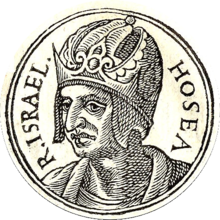

Content in this edit is translated from the existing Hebrew Wikipedia article at [[:he:הושע בן אלה]]; see its history for attribution.{{Translated|he|הושע בן אלה}} to the talk page.Hoshea
King Of Israel

Reign
c. 732 – c. 722 BC
Predecessor
Successor
Monarchy abolished
Born
c. 759 BC
Died
c. 722 BC (aged c.36)
Father
Elah
Hoshea (Hebrew: הוֹשֵׁעַ, Hōšēaʿ, "salvation"; Akkadian: 𒀀𒌑𒋛𒀪 A'úsiʾ [a-ú-si-ʾ]; Latin: Osee) was the nineteenth and last king of the northern Kingdom of Israel and son of Elah (not the Israelite king Elah). William F. Albright dated his reign to 732–721 BCE, while E. R. Thiele offered the dates 732–723 BCE.[1]
Assyrian records confirm the Biblical account of how he became king. Under Ahaz, Judah had rendered allegiance to Tiglath-Pileser III of Assyria, when the Northern Kingdom under Pekah, in league with RezinofAram-Damascus, had attempted to coerce the Judean king into joint action against Assyria. Hoshea, a captain in Pekah's own army, placed himself at the head of the Assyrian party in Samaria; he then removed Pekah by assassination; Tiglath-pileser rewarded Hoshea by making him king over Ephraim (a name used here for the entire northern kingdom), which had been reduced to smaller dimensions.[2] An undated inscription of Tiglath-Pileser III boasts of making Hoshea king after his predecessor had been overthrown:
Israel (lit. : "Omri-house" Bit-Humria)…overthrew their king Pekah (Pa-qa-ha) and I placed Hoshea (A-ú -si') as king over them. I received from them 10 talents of gold, 1,000(?) talents of silver as their [tri]bute and brought them to Assyria.[3]
The amount of tribute exacted from Hoshea is not stated in Scripture, but Menahem, about ten years previously (743 or 742 BCE)[4] was required to pay 1,000 talents of silver to Tiglath-Pileser in order to "strengthen his hold on the kingdom" (2 Kings 15:19), apparently against Menahem's rival Pekah.
So long as Tiglath-pileser was on the throne Hoshea remained loyal; but when Shalmaneser V succeeded, Hoshea made an effort to regain his independence and entered into negotiations with So, King of Egypt. Probably misled by favorable promises on the part of Egypt, Hoshea discontinued paying tribute. Winckler contends that in this anti-Assyrian movement, in which Tyre also had a share, a last effort was made on the part of the Arabic commercial states to shut out Assyria from the Arabo-Indian commerce, for which possession of the Mediterranean ports was of vital importance.[2]
Shalmaneser soon interpreted this as rebellious, and directed his armies against Samaria. The Assyrian Eponym Canon shows that Shalmaneser campaigned "against" (somewhere, name missing) in the years 727, 726, and 725 BCE, and it is presumed that the missing name was Samaria.[5] The Babylonian Chronicle states that Shalmaneser ravaged the city of Sha-ma-ra-in (Samaria).[5] Additional evidence that it was Shalmaneser, not Sargon II who initially captured Samaria, despite the latter's claim, late in his reign, that he was its conqueror, was presented by Tadmor, who showed that Sargon had no campaigns in the west in his first two years of reign (722 and 721 BCE).[6]
It is likely that Hoshea, disappointed by the lack of Egyptian support, endeavored to avert the calamity by resuming the payment of tribute, but that, distrusted, he was forced to fight and was taken prisoner in battle. Though deprived of its ruler, the capital mounted an effective defense.[2] However, the Assyrians captured Samaria after a siege of three years. Shalmaneser V died shortly after the city fell, and the Assyrian army was recalled to assure the succession of Sargon II. The land of Israel—which had resisted the Assyrians for years without a king—again revolted. Sargon II returned with the Assyrian army in 720 BCE and conquered the kingdom, deporting its citizens beyond the Euphrates (some 27,290 according to the inscription of Sargon II), and settling people from Babylon, Cuthah, Avva, Hamath and Sepharvaim in their place (2 Kings 17:6, 24). According to the Books of Kings, this destruction occurred "because the children of Israel sinned against the Lord" (2 Kings 17:7–24). What happened to Hoshea following the end of the Kingdom of Israel, and when or where he died, is unknown.
In the mid-1990s, an unprovenanced bulla appeared on the antiquities market. The seal has been dated by André Lemaire to the second half of the 8th century BCE on paleographic grounds, and its inscription reads "Belonging to Abdi, servant of Hoshea". If authentic, it is perhaps the only archaeological attestation of Hoshea in an Israelite inscription found to date.[7]
See also
International
National